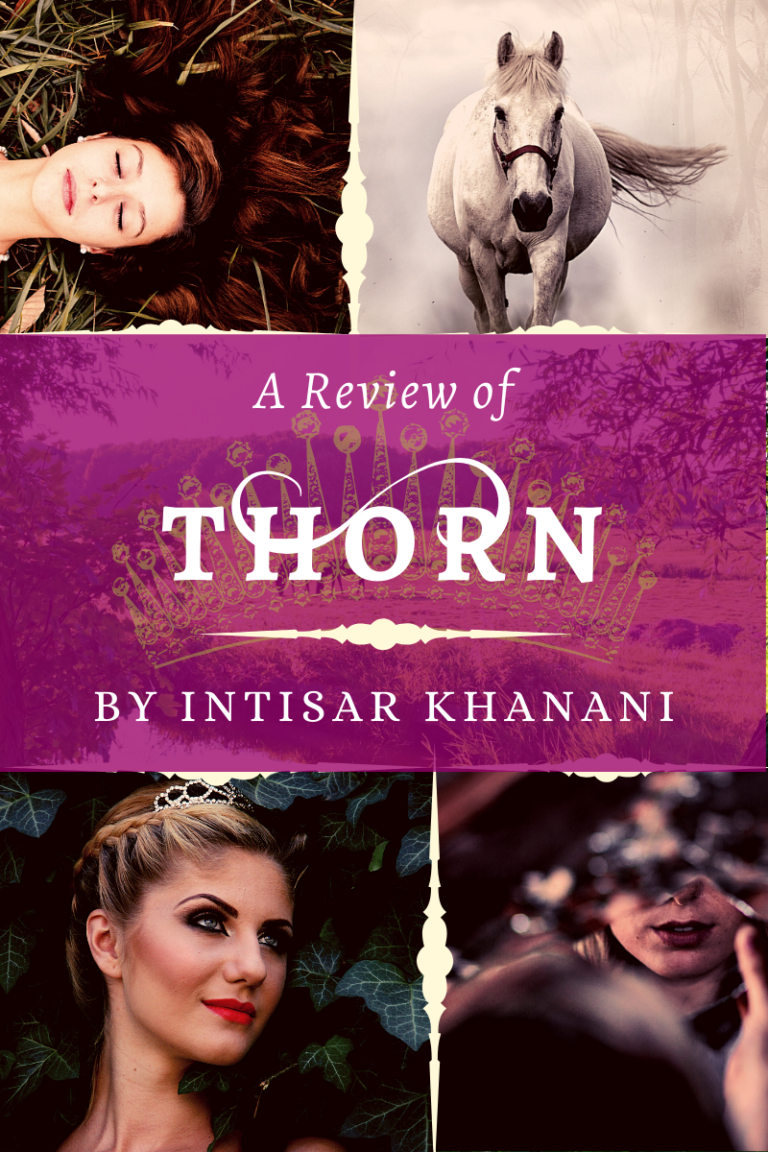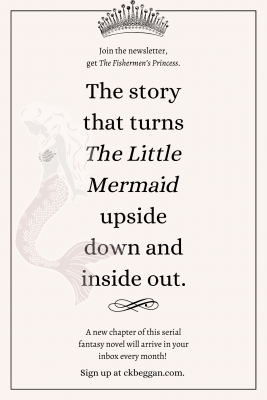I’m here with another fairy tale telling this week, this time by an author in both the indie and traditionally published world, thanks to this very story.

“This is the life I’ve made for myself, and I want it in a way I haven’t wanted anything else I can remember. It is a wanting that is quiet, and steady, and deep as the beat of my heart.”
— Princess Alyrra in Thorn
The first time I read this book, it was an indie read from a purely indie author. Years later, Intisar Khanani’s retelling of the Goose Girl fairy tale is a traditionally published release that’s undergone some major changes.
Main character and narrator Alyrra is a princess, but not like you’d imagine. Downtrodden and the victim of years of abuse, she has been all but cast aside by her mother, the queen, and is the subject of vicious hate from her brother the heir. (The events that lead to this extreme situation are detailed in the Khanani’s recent release, Brambles.)
Outside of this, Alyrra lives a quiet life. She enjoys the wilderness around her home, has the respect of the servants and has occasional visits from the Wind. It all changes when she becomes the betrothed of Prince Kestrin, heir of the troubled royal family of Menaiya. And then it gets worse. When an old enemy from court, Valka—the lady once destined to marry Alyrra’s brother and become queen—returns to accompany Alyrra to her new kingdom, Valka uses the help of a vengeful sorceress to take Alyrra’s place—and her body.
A princess uncomfortable with power
“Still, should I run so far that I reach the sea, I should not have run far enough, for the thing I run from rides on my back and in my blood, and will not be shaken.”
– The magically disguised Princess Alyrra, after fighting back against goose boy Corbé in Thorn
Disgraced by Valka, Alyrra is relegated to the role of palace goose girl and, unable to stand being called Valka, becomes Thorn. There, she discovers a different life that has the quiet she always loved. For once, her fate is in her hands, and the weight of a kingdom’s expectations is off her shoulders. “This is the life I’ve made for myself,” Alyrra narrates, “and I want it in a way I haven’t wanted anything else I can remember. It is a wanting that is quiet, and steady, and deep as the beat of my heart.”
But Alyrra can’t quite escape her responsibilities, or what’s followed her from home: the cruelty of the women in her life and the violence of the men. Valka is using the court for her own means, and that of the sorceress; the goose boy Alyrra works with has bad intentions, and women and children in Menaiya are not safe on the streets.
It isn’t all dark. When Alyrra befriends a magical horse, Falada, she has her first true friend, and more are soon to follow. But Falada is never shy (yes, a horse pun) about reminding her that she owes it to Menaiya to stop Valka and take her true place.
In the middle of all of this is Kestrin, and interesting character and unusual prince. Alyrra is never quite sure what to think of this seemingly harsh, then thoughtful young man. As he begins to test her, Valka digs deeper for more cruelty, threatening Alyrra if she continues to meet with Kestrin.
Thorn makes for a grim fairy tale, full of the dark sides of humanity. But it’s also full of the joy of found family, and warms readers hearts when Alyrra finds safety and comfort. As she begins to come into her own, Alyrra becomes an advocate for empathy and humanity like no other.
It’s taken me a while to write this review of Thorn, though I read the new version months ago. I was disappointed with the early part of the book. It didn’t grab me the way that the original, indie version did. When I glanced back at the opening of indie Thorn, I realized what I was missing. Alyrra’s nervous energy kept the early chapters moving quickly and reflected her necessarily alert nature. Traditionally published Alyrra was downtrodden and had given up, and accordingly had a more lethargic pace to her narration. I felt like her personality had disappeared.
I was bothered by this, as you might imagine. I loved this story (I still love it, it just takes longer to be itself), and I felt like Alyrra’s personality was reduced to “resigned victim” at the beginning. In the later chapters, when Alyrra says, “In this moment I stand for all I am, and have been, and have known, every whisper of pain and memory and fear. I am all this, and I will stand strong and fight,” there is a bigger payoff, with more character growth and a larger character arc.
Beautiful books by Intisar
Khanani’s elegant writing shines in the new version of Thorn.
Still, I miss that frightened, engaged Alyrra, so alert and protecting herself at every moment like a rabbit in a forest full of wolves (which is actually a good description for her home). She had survivor’s instincts, and that same drive for self-preservation led her to step aside while Valka became princess, rather than just sit back. She was a downtrodden but active heroine who made an understandable, though unusual choice. Traditionally published Alyrra takes longer to find any rays of sunshine, let alone her power.
One benefit to the slower pace of the new Thorn is that it makes more room for Khanani’s wonderful prose to blossom. “I miss the crisp coldness of the forest winters I have known,” Alyrra muses in the narration. “I daydream of warm bread and mittens and the weight of snow on pine trees. The winter here is a different creature altogether, lying heavily over my shoulders and stealing into my bones.” All of my highlights from this book were of Khanani’s prose.
Thorn left me moved, joyful and heartbroken all at once. No matter how it’s changed, it’s a book worth savoring—plus there’s the added bonus of being introduced to Rae in The Bone Knife, a once stand-alone short story. I can’t wait to read The Theft of Sunlight, where the story follows Rae and just might cross paths with Alyrra.
Note: In addition to the Dauntless Path titles mentioned, the prequel to Alyrra’s story, Brambles, is also available.



